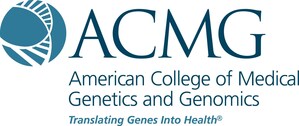
BETHESDA, Md., March 31, 2021 /PRNewswire/ -- How will greater availability of DNA testing change genomic medicine? What are the opportunities and challenges when performing predisposition testing of healthy individuals?
To answer these questions and in an effort to provide practical guidance on DNA-based screening for healthy individuals, the American College of Medical Genetics and Genomics (ACMG) has released "DNA-based screening and personal health: a points to consider (PTC) statement for individuals and healthcare providers from the American College of Medical Genetics and Genomics (ACMG)" in its official journal, Genetics in Medicine.
While acknowledging that much remains to be learned about the clinical utility of genomic sequencing in a healthy population, the ACMG seeks to promote the most effective use of genetic and genomic information by offering this PTC document. The document is meant to help guide discussions about potential benefits, potential harms and limitations of DNA screening for healthy adults through each essential step in the testing process.
"Genomic sequencing, once accessible only for the diagnosis of rare disease, is becoming more widely available to the public. As genetic healthcare providers, we must seize the opportunity to educate, guide and lead those who choose this technology to inform their healthcare decisions," said Lora J.H. Bean, PhD, FACMG, lead author and member of the ACMG Laboratory Quality Assurance Committee.
A few of the specific points to consider include:
- Greater availability of DNA screening tests will necessitate the development of effective educational materials that teach genetic/genomic principles and aid in test interpretation for a variety of education levels.
- Professional organizations have consistently endorsed an informed consent process prior to genetic testing to review the potential benefits, harms and limitations of testing including the implications of results for the patient and their family members. Regulators will need to determine what constitutes adequate informed consent for consumer-driven genetic testing and how these standards compare to the requirements of traditional healthcare models.
- Expansion of DNA screening tests will be governed by HIPAA and CLIA requirements and will require regulatory oversight for ownership, storage and use of data beyond its intended clinical purpose. Therefore, data storage approaches that are affordable, accessible, interoperable and secure must be developed.
- Regulatory requirements for a standard set of laboratory metrics would allow transparent comparison among laboratories. Additionally, laboratories may need to meet new requirements for education and consent to offer consumer-directed testing.
- With regard to laboratory reporting, given that many interpretive and technical limitations will be overcome with time, recommendations for when to reinterpret data and when to repeat testing are needed. Standards and regulatory requirements for storing and sharing of large data sets will need to be updated or established as well.
- Clear and authoritative recommendations on the best practices for clinical management of patients with variants associated with genetic disorders are needed to fully realize the benefits of DNA screening tests.
The statement concludes that even though the application of DNA-based screening tests for healthy individuals is in its infancy, and much remains to be learned about the clinical utility of genomic sequencing in a healthy population, the public's interest in obtaining their own genomic information is likely to increase, along with the demands on healthcare providers to assist patients in accessing testing, interpreting results and using the results in their medical care.
About the American College of Medical Genetics and Genomics (ACMG) and ACMG Foundation
Founded in 1991, the American College of Medical Genetics and Genomics (ACMG) is the only nationally recognized medical professional organization solely dedicated to improving health through the practice of medical genetics and genomics, and the only medical specialty society in the US that represents the full spectrum of medical genetics disciplines in a single organization. The ACMG is the largest membership organization specifically for medical geneticists, providing education, resources and a voice for more than 2,400 clinical and laboratory geneticists, genetic counselors and other healthcare professionals, nearly 80% of whom are board certified in the medical genetics specialties. ACMG's mission is to improve health through the clinical and laboratory practice of medical genetics as well as through advocacy, education and clinical research, and to guide the safe and effective integration of genetics and genomics into all of medicine and healthcare, resulting in improved personal and public health. Four overarching strategies guide ACMG's work: 1) to reinforce and expand ACMG's position as the leader and prominent authority in the field of medical genetics and genomics, including clinical research, while educating the medical community on the significant role that genetics and genomics will continue to play in understanding, preventing, treating and curing disease; 2) to secure and expand the professional workforce for medical genetics and genomics; 3) to advocate for the specialty; and 4) to provide best-in-class education to members and nonmembers. Genetics in Medicine, published monthly, is the official ACMG journal. ACMG's website, www.acmg.net offers resources including policy statements, practice guidelines, educational programs and a 'Find a Genetic Service' tool. The educational and public health programs of the ACMG are dependent upon charitable gifts from corporations, foundations and individuals through the ACMG Foundation for Genetic and Genomic Medicine.
Kathy Moran, MBA
[email protected]
SOURCE American College of Medical Genetics and Genomics







Share this article